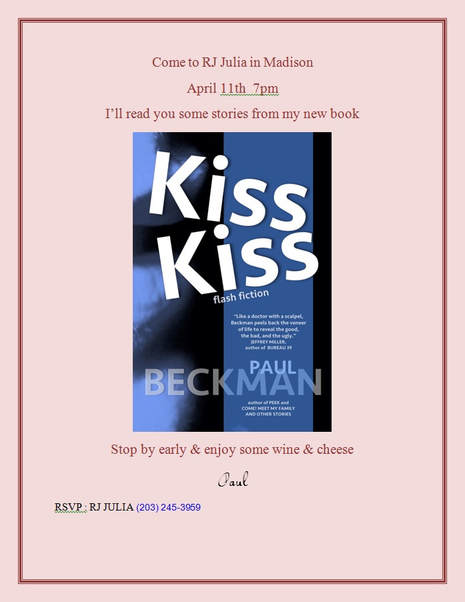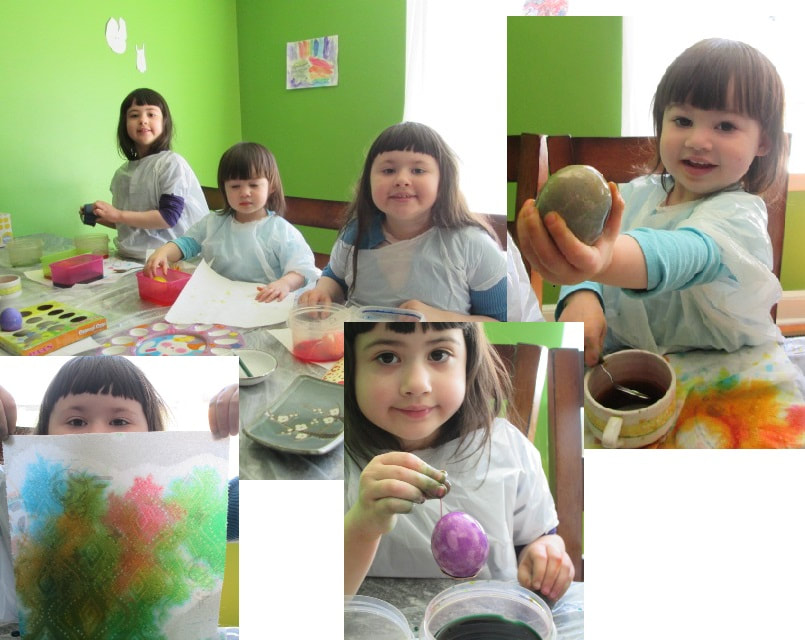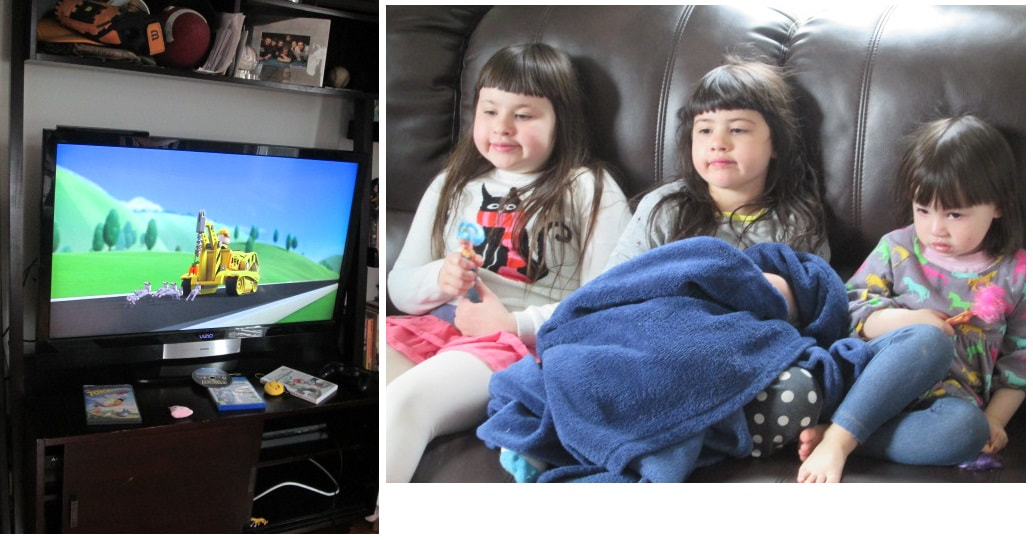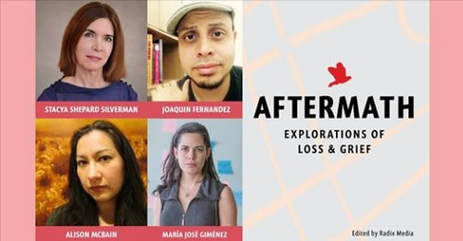 It's here! It's here! The release of Aftermath: Explorations of Loss & Grief is tomorrow. Radix Media is hosting a book release party with contributors Joaquin Fernandez, Stacya Shepard Silverman, María José Giménez and myself at the Greenlight Bookstore at 686 Fulton Street in Brooklyn at 7:30pm. Hope to see you there!
0 Comments
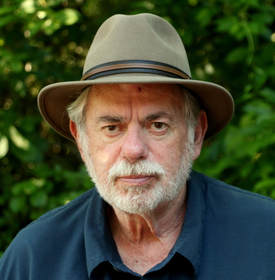 I first met Paul Beckman in 2017 through Doug Mathewson, editor of the pocket-sized journal Blink-Ink. Paul had arranged a reading of local flash fiction writers at Best Video in Hamden, Connecticut, and invited Doug and me to be a part of the reading. I was completely thrilled to join in - it was my first, official time reading any of my fiction in public, and it was with a wide variety of amazing and talented writers. Flash fiction might possibly be my favorite form to write, and it's certainly one of my favorites to read. It was fantastic to meet such a master of the short form as Paul. Afterwards, Paul was generous enough to agree to have a chat with me about his writing and inspirations, his latest book to be released, and a host of other happenings he's involved with. To let you know a little bit about Paul from his official bio: Paul Beckman is the author of the collections - “Peek” & “Come! Meet My Family and other stories", a novella, “Lovers and Other Mean People”, and a flash chap book, “Maybe I Ought to go Sit Quietly in a Dark Room for a While”. His story, “Healing Time” was one of the winners in the 2016 Best of the Small Fictions. Over 400 of Paul’s stories are widely published in print, via audio, and online in the following magazines among others: Connecticut Review, Literary Orphans, Blue Fifth, Litro, Playboy, Jellyfish Review, Brilliant Flash Fiction, Red Fez, Necessary Fiction, Fictive Dream, Molotov Cocktail, and Thrice Fiction, Spelk Fiction among others. His blog is www.pincusb.com. Paul hosts the FBomb NY flash fiction reading series monthly at KGB’s Red Room in New York and had a story picked for the 2018 Norton Anthology of Micro Fiction. He has a new collection of Flash and Micro Fiction, KISS KISS due out in late March. Paul, thank you so much for doing the interview with me! I really enjoy humor and flash fiction, and I generally prefer the two of them together. You write really memorable short stories that span the literary genre, from the aforementioned humor - to slice of life - to surreal. What drew you to the short form of fiction? Hi Alison. Big thanks for doing this interview. I morphed unknowing ling into the short form we call Flash Fiction. I was writing Flash before I knew it had a name. My short stories were most often in the 1500 -2000 words and I did write a few up to 4000, but my sweet spot was the 1500 - 2000 range. I had a New York agent for a while and she placed a 1200 word story, "Two Ships" with Playboy. I do remember the first flash I read. It was by Leonard Michaels and was called "Something Evil". Years later I was reading one of his collections and "Something Evil" was just a part of a longer story, but it held up well on its own. The collection, Sudden Fiction, came out in 1983 edited by Robert Shepard and James Thomas and it was a shout out to me, as were the quarterly collections of The Quarterly edited by Gordon Lish. Not all of Lish's stories were Flash but all were short and many were what we would call Flash today. In 1995 my first story collection came out, "Come! Meet My Family and other stories" and looking over it a couple of years ago I realized I had quite a number of Flashes in it. 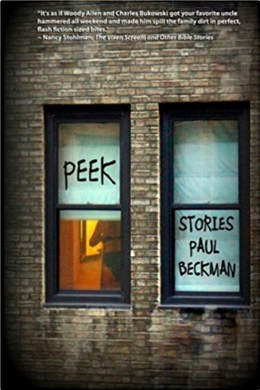 I've enjoyed reading two of your recent short story collections, Peek (2015) and Kiss Kiss (2018) (reviews of these two works are to come out/have come out in Bewildering Stories.) There are some reoccurring dark themes in your stories, including living in the projects, alcoholism, poverty, physical and mental abuse, hunger, sexual problems, infidelity, marital and relationship difficulties, dysfunctional families and neglected children. Very serious problems are at the heart of almost every story, and you're skillfully able to turn these situations on their head and open the eyes of the reader to the absurdity in each one. What about the pathos of these situations screams "humor" to you? This is one intense question, Alison. Looking back at my younger years I used humor to offset the pains of poverty, of being bullied, of being debased, and punished both physically and mentally. Jealousy of students in high school who had cars, money, and lived in houses with lawns not pavement. This was a constant in my life so I hung out with the kids who took what they wanted, talked back, snooped, ranked, fought, stole, and worked. I always worked and was always angry that I had to give the bulk of my pay to my mother. No doubt she needed it but I saw it as injustice and grew up fighting perceived injustices. I see my writing as my therapy, as my chance to play God, my chance to become, to experience, to have, to play pranks, and to be. My shots at getting back at authority figures: teachers, relatives, rabbis, sergeants, bosses, police, zoning officers and, and, and. And in all of this writing I see the absurd--always the absurd and the humor in situations that most of my characters, friends, and relatives would not find humorous even though they often find my writing humorous and off the wall. I don't write memoir. I write fiction which very often is precipitated by a real life occurrence--sometimes mine and oftentimes behaviors observed and expanded. And, I still have a hard time with injustice. 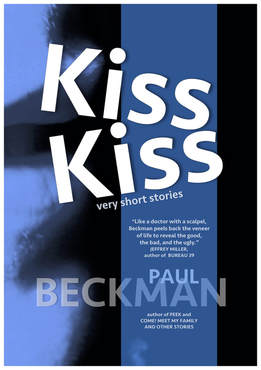 Thank you for your honest answer, Paul. A quote that has always inspired me is by Octavia Butler: "Every story I create, creates me. I write to create myself." And as writers, I feel that we take a part of ourselves, be it large or small, and find a way to expand it so that others can see what we see and hopefully take something important from it. That brings me to my next question - do you write stories as they come to you, or do you pen your work with an intended audience? If conscious of your audience, what do you hope readers will take away from your work? For the most part I write stories that come to me and I would give the same answer if I were writing to most prompts. I do not know the ending of a story until I get to it--the same with the second paragraph. Alice Mattison, a long time mentor, friend and terrific writer used to talk about her characters giving her direction and I thought that it would never happen to me. Now, all these years later, it happens frequently. The occasional prompt that I write to that's so specific that I find myself writing to an audience I would like my readers to finish the story and believe in it. You seem to tackle a lot of subjects that are perhaps completely UN-prompted - subjects that other writers might find taboo. For example, in your latest collection, you have stories containing ideas such as a penis that falls off but is still useful to its owner, peeping toms, facial ass hair, grandma's sexual escapades, a woman with an arachnid fetish, incest, role reversals, a deadly ball of dental floss, and urine as a medical cure. Are there any lines that you feel shouldn't be crossed in literature, or is everything fair game? When you write that list it doesn't seem as if I have any taboos so I guess I don't if the subject matter is handled right and I think I do. I know that a great many magazines list topics they're not interested in publishing and that's fine but I manage to temper sensitive subjects with the bizarre or humorous and that comes natural to me. It certainly does come naturally! You can make the bizarre seem normal and the ordinary seem strange, many times using twenty words to tell a story that takes other authors a whole novel to reveal. You're a master at the short form. I'm curious, though - do you think you'd ever write a longer work? For example, Mirsky and Elaine are reoccurring characters who appear in a number of stories. Would you ever write a book about them? I wrote my first Mirsky story over thirty years ago with no intention of making him (he was a 12 year old boy) a recurring character. I think it was the only time I used his first name, but he didn't have a last name. When I decided to write another story I also decided I only wanted to use his last name and I only wanted two syllables so I drove to a Jewish cemetery in Bridgeport and walked around until I found a name I liked and it was Mirsky. Others have asked the same question about a longer piece with Mirsky and Elaine but unlike a short story I'd have to be struck with a concept first. This is great. I think I'll make it my epitaph. You can make the bizarre seem normal and the ordinary seem strange. And of course I'd credit you on the stone. Ha ha, I've never gotten stone cold credit before. Or would it be cold stone credit? Speaking of crediting, you mentioned the first flash you read was by Leonard Michaels. What other authors/creatives would you say have been influences on your writing? Lydia Davis, Isaac Babel, Frederick Barthelme, Sholem Aleichem, Joy Williams, Etgar Keret, Mark Helprin, Diane Williams, Pamela Painter, Robert Scotellaro, Kathy Fish, Len Kuntz, Nancy Stohlman, Steve Almond, Tillie Olsen, Melissa Goodrich, and so many more. What are you writing right now? Any new collections/stories in the works? I'm compiling a chapbook of hardboiled/noir Flash stories for a chap book. I've got about two dozen so far and at least half have been published. I've also been asked by a publisher to add stories from "the projects" to make a collection. Additionally, I continue to write Flash and submit stories on a regular basis. Now the final questions - where can readers find out more about you and your writing? Will you be doing any readings or appearances soon? I'm working on that with a publicist now but my Launch reading will be at R.J. Julia Bookstore in Madison CT April 11th at 7pm. I will also be reading at KGB and the Cornelia Café--dates to be announced. And I'll be reading in Denver in Aug at their FBomb series. More to come. I've really enjoyed chatting with you, Paul. Thank you so much!
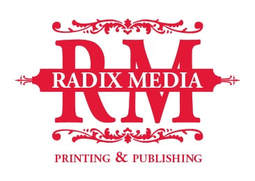 Radix Media is soon to release their inaugural anthology, entitled Aftermath: Explorations of Loss & Grief. Among the 33 contributors from around the world are the very talented writers Kristina V. Ramos, Andy Connor, Joy Kennedy-O'Neill, Joaquin Fernandez, Stacya Shepard Silverman and María José Giménez. You can find interviews with these writers and excerpts from the anthology on Radix Media's blog here. I am thrilled to say a poem of mine will also be included in the anthology, and a short interview about my poem was released on Radix Media's blog today. You can read my interview here. If you'd like to hear the poem in person and say hi to several of the local contributors, including Joaquin Fernandez, Stacya Shepard Silverman, María José Giménez and myself, stop by the book release party at the Greenlight Bookstore at 686 Fulton Street in Brooklyn on April 26th at 7:30pm. Hope to see you there! |
Who the heck is Alison McBain?I am a freelance writer and poet with over two hundred short pieces published in magazines and anthologies. Check out my 2024 writing challenge to write a book a week at Author Versus AI. For more info, please check out my "About Me" page. © Alison McBain. All rights reserved
Archives
July 2024
|


